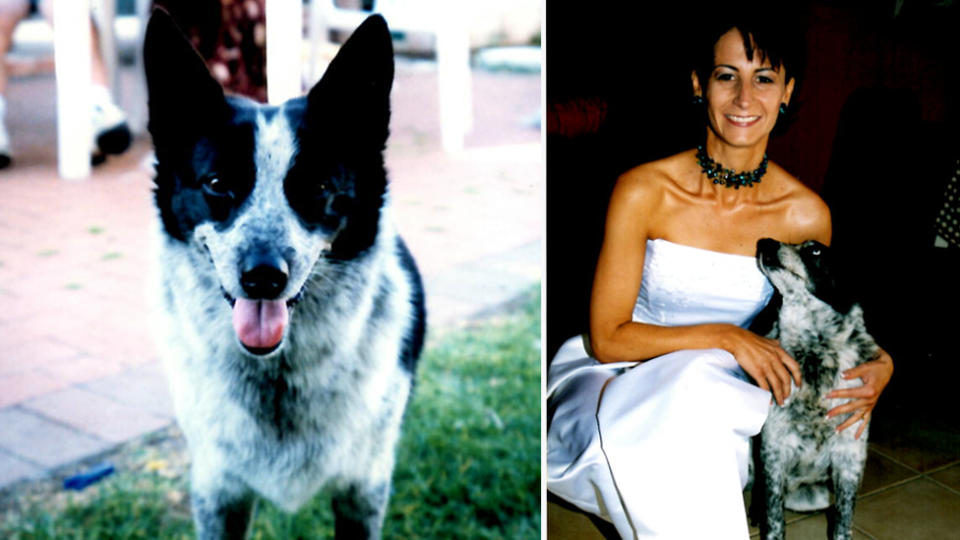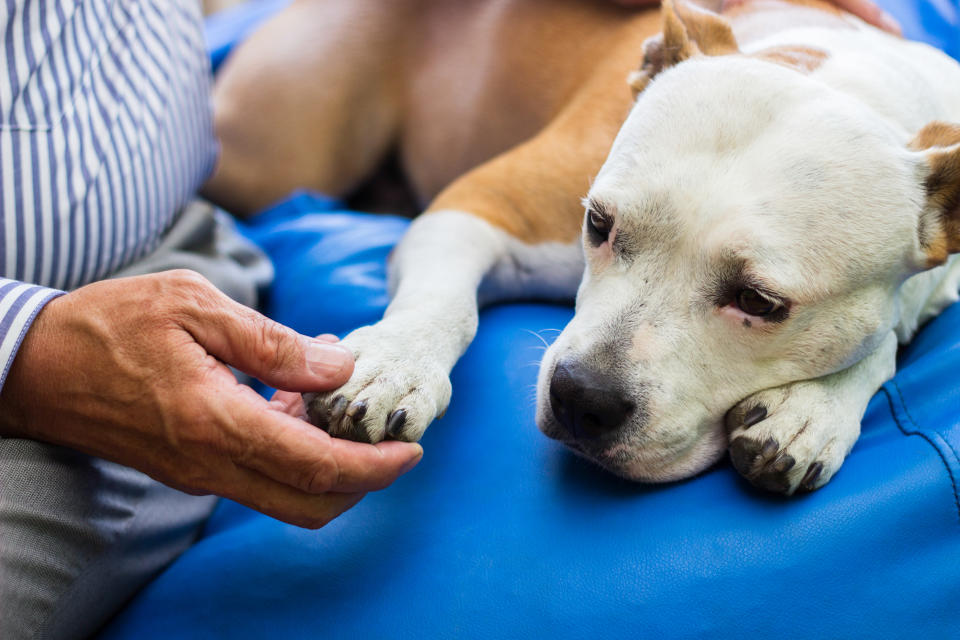'My world fell apart': The dark and hidden toll of losing 'just' a pet
Vicky Nonas felt like she was losing her mind.
She had been crying for weeks but when she told people why she was so distraught they “looked at me like I had two heads”.
Ms Nonas had just lost the dog who had been by her side for nearly two decades and her grief felt bottomless.
She had been just 15 when Boofey, a blue-heeler-cross-kelpie, came into her life. He was even born in front of her –– an accident that came about after the neighbour’s dog slipped through the backyard fence.
The pair “essentially grew up together” and he was right by her side for most of her life.
He was there when she lost both of her brothers.
He was there when she was facing homelessness.
He was even there on her wedding day.
So when the day eventually came, after 18 long years, that Boofey was suddenly no longer there, Ms Nonas was left floundering in a well of grief that felt infinite.
“My world literally fell apart,” she tells Yahoo News Australia.
“I knew to some extent that his loss would have an effect on me. But ... there was a real underestimation of what his loss would do to me.”

Ms Nonas had gone looking for help and found a counsellor who had shown empathy for her grief initially, but as time went on and she was still grieving Boofey’s loss, the counsellor told her she had been “too attached to the dog”.
It made her even worse.
Even the people closest to her who should have understood what Boofey meant to her had dismissed Ms Nonas’ grief as insignificant and trivial, or they had been perplexed by the time it was taking her to “get over” Boofey’s death.
“There was no acknowledgement or validation for me having lost him. I felt very isolated and ... completely abnormal. [I thought] I was going crazy,” she recalled.
No one seemed to understand that if it wasn’t for “just a dog”, Ms Nonas wasn’t sure if she’d “still be going”.
Pet loss and disenfranchised grief
Despite having one of the highest rates of pet ownership in the world (62 per cent of the population, according to the RSPCA), grief around pet loss continues to be minimised and misunderstood in Australia.
And according to veterinarian and the co-founder of Australia’s first pet loss helpline, Dr Michael O’Donoghue, this is only going to get worse.
“The need’s greater than ever [for pet grief counselling] ... People are more intensely bonded with their pets than ever before,” Dr O’Donoghue tells Yahoo News Australia.
“In one generation or two [pets have] gone from the backyard to the bedroom. Pets are living longer. People are more estranged from their families — they’re either from broken families or families that are distributed around the world. We’re having a smaller number of children, and the bonds we form with our pets are incredibly close in our lives.”

Dr O’Donoghue had become acutely aware of the intensity and depth of the human-animal bond when he was still a vet student, but also, the ways in which Australian society fell short when it came to recognising pet loss grief as real and valid.
In 1992 he was attending a conference in the United States on just this topic when he visited a call-centre for pet loss. He was given the opportunity to listen in to some of the calls coming in and was “taken away by the depth of grief people felt”, sometimes even months after a pet’s death.
“It was devastating the depth of grief people felt,” Dr O’Donoghue recalls.
The experience left such an impression on the young man that he returned to Australia determined to establish some kind of similar helpline, but it would be years before this idea could be brought to fruition.
Then O’Donoghue met Penny Carroll, a counsellor with similar interests surrounding pet loss and grief who also saw huge failings in how people had grief over a pet’s death acknowledged, or rather, didn’t.
Eventually, in 2017, the pair were able to set up Pets and People, a national hotline where those bereaved by an animal’s death could be put through to a trained counsellor with expertise in pet loss grief.
Because, as Dr O’Donoghue explains, having grief acknowledged as valid and real plays a huge and crucial part in a person’s recovery and healing process.
“It’s not the same thing [as when a human dies],” he says.
“There’s no funeral; people don’t ... come over to your house and [have a] big ceremony ... people don’t gather at your house for a week.”
These “normal healing rituals” don’t follow the death of a pet the way they do for a human and this often complicates the grief process, Dr O’Donoghue says.
The grief is further exacerbated by the person who’s bereaved not openly expressing it –– which is often a result of other people around that person not being able to “get it”.

The quiet suffering experienced by many people going through the loss of an animal has come to be recognised as “disenfranchised grief” by many psychologists and counsellors.
“In the case of pet loss, society has proscribed pet-related bereavement as unacceptable,” development psychologist Dr Millie Cordaro writes in the Journal of Mental Health Counselling.
“The implicit norm … is that the bonds forged between people and companion pets do not have the same depth and meaning as bonds between people; therefore, the grief felt when a pet dies should not be as intense as when another person dies.”
A person bereaved by the loss of a pet often feels the weight of social attitudes which “discourage pet owners from openly grieving” because their loss is not seen as legitimate.
This stigmatisation can thereby complicate and even exacerbate a person’s grief and suffering because, as Dr Cordaro writes, “social support and empathy are vital for the resolution of grief”.
Without it, the grief can be exacerbated.
‘I was a bit ashamed of what I was feeling’
This was very much Vicky Nonas’ experience after the death of Boofey.
Nearly two years after her dog’s death, she was still crying most days and feeling “crazy”.
But she refused to accept what those around her were saying. Boofey had been a crucial presence in her life who was there for her for 18 long years –– unlike a lot of people. Her pain for him was real.
“It was literally a good year and a half before I could lift my head and focus on anything else. I functioned but I wouldn’t say I functioned very well,” Ms Nonas tells Yahoo News Australia.
“I was a bit ashamed of what I was feeling.
“It was the most intense pain I’d ever felt in my life and it was prolonged largely because my pain was denied, or minimised.”
After a prolonged amount of time and lots of study and research though, she began to understand that everything she was feeling was normal, so when Ms Nonas began the career move into counselling she knew she wanted to focus on pet loss and grief.
Today, as a registered counsellor with her own business –– By My Side Pet Loss Counselling––, Ms Nonas also supports those who call into Pets and People Loss Support Line, and estimates she’s one of only a dozen counsellors in Australia who specialise in this type of grief.
“It’s still very niche and I think there’s a lot of people who still don’t know that this support exists because it is fairly new,” she says.
While Ms Nonas believes things have progressed since her own dog’s death, the vast majority of her clients come to her relieved to have finally found someone who acknowledges their loss as deeply painful.
“It is a legitimate loss. The grief is real,” she says, explaining that her counselling sessions with clients often need to begin with a clear acknowledgment of the importance and authenticity of the human-animal bond.
“For me, [Boofey] was my rock, my world, he was my protector, my everything...The loss of my dog brought me to my knees.
“I will never apologise for loving my Boofey the way I did and still do. If it wasn’t for ‘just a dog’ I’m not quite sure I’d be still going.”
Readers seeking support for pet loss and grief can do so through the 24/7 Pets and People Loss Support Line on 1300 431 450. New Zealand readers can seek support on 0800 114 421.
For others seeking support and information about mental health or suicide prevention can contact Beyond Blue on 1300 22 4636, Lifeline on 13 11 14 or Suicide Call Back Service on 1300 659 467.
Do you have a story tip? Email: newsroomau@yahoonews.com.
You can also follow us on Facebook and Twitter, download the Yahoo News app from the App Store or Google Play and stay up to date with the latest news with Yahoo’s daily newsletter. Sign up here.


